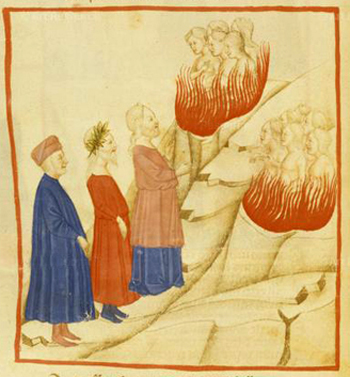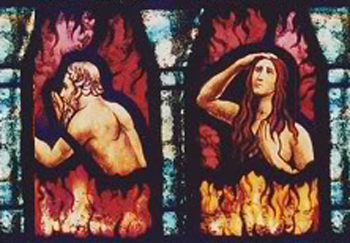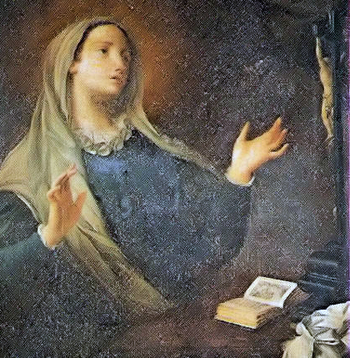Faith under Attack
 |
 |
 |
 |
 |
 |
 |
On Purgatory - Part II
The Need for Purgatory & the Pain of Loss
Some persons have asked, "Why must souls suffer before they can see the face of God?" Doesn’t the Sacrament of Penance sufficiently remove the effects of sin from the soul and pay the debt required for forgiveness?”
According to theologians, it is not the guilt of sin but the debt of pain proceeding from sin that requires expiation. (1) Sin produces two effects on the soul: the guilt for offending God and the penalty to be paid for that crime. In the Sacrament of Confession the priest absolves the guilt when the person is duly repentant. This is called the pain of guilt, which is removed by the absolution.
 However, the price of penalty still remains to be paid. When the penance imposed by the priest is not sufficient to equal the penalty due to Divine Justice, something else needs to be paid. This something else that was not duly compensated is called the debt of pain. If, when the person dies, he still has this latter debt, he must make satisfaction for it before Divine Justice by suffering in Purgatory.
However, the price of penalty still remains to be paid. When the penance imposed by the priest is not sufficient to equal the penalty due to Divine Justice, something else needs to be paid. This something else that was not duly compensated is called the debt of pain. If, when the person dies, he still has this latter debt, he must make satisfaction for it before Divine Justice by suffering in Purgatory.
The debt of suffering comes from all the faults committed during life, especially from mortal sins. Although the guilt is remitted by a good confession, the sins have not been expiated by the worthy fruits of exterior penance. What constitutes this debt of pain is the remains of many penalties for which satisfaction has not been made, a kind of stain, which places an obstacle to the union of the soul with God.
St. Catherine of Genoa states that even though souls in Purgatory are necessarily freed of the guilt of sin, there is still a barrier between them and union with God so long as imperfections exist. (2) In her Treatise on Purgatory, she explains the soul feels this barrier within himself and desires to make this expiation demanded by Divine Justice:
“I see that the divine Essence is of such purity that any soul, unless he is absolutely immaculate, cannot bear the sight. If, in the presence of the Divine Majesty, the soul finds in himself the least atom of imperfection, rather than dwell there with a stain, he would plunge himself into the depths of Hell. Finding a means to blot out his stains in Purgatory, the soul [voluntarily] casts himself into it. He esteems himself happy that, by the effect of a great mercy, a place is given to him where he can free himself from the obstacles to attain supreme happiness.” (3)
Thus, the souls suffering in Purgatory fully understand and embrace the pains they must endure. They see clearly how serious before God is even the slightest obstacle raised by the remains of sin.
 In his book Purgatory Explained, Fr. Schouppe notes, “The souls are in continual union with God in Purgatory. They are perfectly resigned to His will, or rather, their will is so transformed into that of God that they cannot will but what God wills. … They purify themselves willingly and lovingly, because such is the Divine good pleasure.”(4)
In his book Purgatory Explained, Fr. Schouppe notes, “The souls are in continual union with God in Purgatory. They are perfectly resigned to His will, or rather, their will is so transformed into that of God that they cannot will but what God wills. … They purify themselves willingly and lovingly, because such is the Divine good pleasure.”(4)
Fr. Schouppe makes a long list of sins that demand expiation. They include the following: sins of lust (impure thoughts, words and deeds), sins of worldliness and giving scandal, sins of the life of pleasure and pursuit of comfort, sins of tepidity, sins of negligence in receiving Holy Communion and lack of respect in prayer, sins of lack of mortification of the senses and the tongue, sins against justice, sins of omission, sins against chastity, sins of the abuse of graces, and sins against the Ten Commandments, especially sins of the flesh.
The guilt of pain still exists for all these sins even after a good confession has been made. That is why Purgatory is a mercy of God. For those who have not sufficiently made expiation in this life, there is a place after death where their souls suffer willingly – albeit greatly – so they can be purified.
The pain of loss
All souls in Purgatory suffer the pain of loss of the sight of God. Some, however, suffer only this pain and not the pain of the senses which will be dealt with in the next article.
 In fact, the torture of the pain of loss is, according to all the Saints and Church Doctors, much more acute than the pain of the senses. We cannot understand this because we have too little knowledge of the Sovereign Good for which we are created. But, in the next life, that ineffable Good seems to souls what bread is to a man famished with hunger, or fresh water to one dying of thirst, or like health to a sick person tortured by a long illness. (5)
In fact, the torture of the pain of loss is, according to all the Saints and Church Doctors, much more acute than the pain of the senses. We cannot understand this because we have too little knowledge of the Sovereign Good for which we are created. But, in the next life, that ineffable Good seems to souls what bread is to a man famished with hunger, or fresh water to one dying of thirst, or like health to a sick person tortured by a long illness. (5)
In The Castle of the Soul, St. Teresa of Avila speaks of the pain of loss: “The pain of loss, or the privation of the sight of God, exceeds all the most excruciating sufferings we can imagine, because the souls urged on toward God, as to the center of their aspiration, are continually repulsed by His Justice. You may picture to yourself a shipwrecked mariner who, after having long battled with the waves, comes at last within reach of the shore, only to find himself constantly thrust back by an invisible hand. What torturing agony! Yet those of the souls in Purgatory are a thousand times greater.” (6)
All the souls in Purgatory suffer the pain of loss, but some souls suffer only this, the privation of sight of God. We should not imagine, however, that this is a light punishment.
This is justified by the words of St. John Chrysostom in his 47th Homily: " Imagine" he says, “the torments of the world. You will not find one equal to the privation of the beatific vision of God." (7)
Continued

Posted December 27, 2013
According to theologians, it is not the guilt of sin but the debt of pain proceeding from sin that requires expiation. (1) Sin produces two effects on the soul: the guilt for offending God and the penalty to be paid for that crime. In the Sacrament of Confession the priest absolves the guilt when the person is duly repentant. This is called the pain of guilt, which is removed by the absolution.

The flames of Purgatory are shown to Virgil and Dante
The debt of suffering comes from all the faults committed during life, especially from mortal sins. Although the guilt is remitted by a good confession, the sins have not been expiated by the worthy fruits of exterior penance. What constitutes this debt of pain is the remains of many penalties for which satisfaction has not been made, a kind of stain, which places an obstacle to the union of the soul with God.
St. Catherine of Genoa states that even though souls in Purgatory are necessarily freed of the guilt of sin, there is still a barrier between them and union with God so long as imperfections exist. (2) In her Treatise on Purgatory, she explains the soul feels this barrier within himself and desires to make this expiation demanded by Divine Justice:
“I see that the divine Essence is of such purity that any soul, unless he is absolutely immaculate, cannot bear the sight. If, in the presence of the Divine Majesty, the soul finds in himself the least atom of imperfection, rather than dwell there with a stain, he would plunge himself into the depths of Hell. Finding a means to blot out his stains in Purgatory, the soul [voluntarily] casts himself into it. He esteems himself happy that, by the effect of a great mercy, a place is given to him where he can free himself from the obstacles to attain supreme happiness.” (3)
Thus, the souls suffering in Purgatory fully understand and embrace the pains they must endure. They see clearly how serious before God is even the slightest obstacle raised by the remains of sin.

The souls suffer with resignation the pains of Purgatory
Fr. Schouppe makes a long list of sins that demand expiation. They include the following: sins of lust (impure thoughts, words and deeds), sins of worldliness and giving scandal, sins of the life of pleasure and pursuit of comfort, sins of tepidity, sins of negligence in receiving Holy Communion and lack of respect in prayer, sins of lack of mortification of the senses and the tongue, sins against justice, sins of omission, sins against chastity, sins of the abuse of graces, and sins against the Ten Commandments, especially sins of the flesh.
The guilt of pain still exists for all these sins even after a good confession has been made. That is why Purgatory is a mercy of God. For those who have not sufficiently made expiation in this life, there is a place after death where their souls suffer willingly – albeit greatly – so they can be purified.
The pain of loss
All souls in Purgatory suffer the pain of loss of the sight of God. Some, however, suffer only this pain and not the pain of the senses which will be dealt with in the next article.

In her Treatise on Purgatory, St. Catherine of Genoa explains how great is the pain of loss
In The Castle of the Soul, St. Teresa of Avila speaks of the pain of loss: “The pain of loss, or the privation of the sight of God, exceeds all the most excruciating sufferings we can imagine, because the souls urged on toward God, as to the center of their aspiration, are continually repulsed by His Justice. You may picture to yourself a shipwrecked mariner who, after having long battled with the waves, comes at last within reach of the shore, only to find himself constantly thrust back by an invisible hand. What torturing agony! Yet those of the souls in Purgatory are a thousand times greater.” (6)
All the souls in Purgatory suffer the pain of loss, but some souls suffer only this, the privation of sight of God. We should not imagine, however, that this is a light punishment.
This is justified by the words of St. John Chrysostom in his 47th Homily: " Imagine" he says, “the torments of the world. You will not find one equal to the privation of the beatific vision of God." (7)
Continued
- F. X. Schouppe, Purgatory Explained by The Lives and Legends of the Saints, Rockford: TAN, 2006, p. 86.
- Catherine of Genoa, Traité du Purgatoire, chap 3, in ibid., p. 87.
- F.X. Schouppe, Purgatory Explained, p. 56.
- Ibid., p. 27.
- Ibid., page 30.
- Ibid.
- Ibid.

Posted December 27, 2013
______________________
______________________





